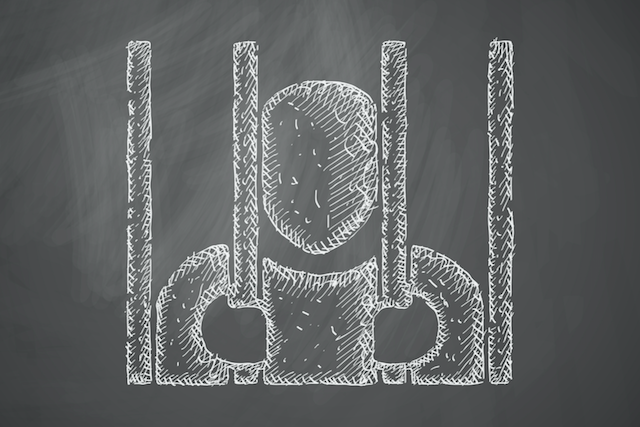
“The most difficult times for many of us are the ones we give ourselves.” ~Pema Chodron
After you come out a meaningful relationship that you didn’t foresee ending, you begin to think about everything you did wrong.
If you were not the one who wanted to the breakup, you may spend a lot of time blaming yourself and wondering about what you could have done differently.
You might begin to believe you’re solely responsible for what went down and that you deserve to spend years in relationship purgatory by yourself, mourning the loss of the person you loved.
You might take all the responsibility and blame as you spend months and years alone.
You may tell yourself terrible things about yourself and what a monster you were in the relationship.
Then you’ll probably feel guilty about everything you did and assume that the relationship ended only because of you.
And you may feel ashamed, unworthy, and unlovable because the other person was so good and you weren’t.
This kind of unhealthy thinking puts all the blame on you and removes all responsibility from your ex.
Your ex moves on and maybe even finds love soon after, while you spend an inordinate amount of time reflecting, hurting, and punishing yourself for what you did.
These are all things I experienced when my marriage ended.
I was such a mess after the marriage, carrying a big brunt of the responsibility, blame, and guilt.
I felt like I had committed a crime against my ex for how badly I’d treated her, how intensely we’d fought, and how dramatically the relationship had unraveled at the end.
If I had been better, wiser, kinder, and more giving, I believed, we could have stayed together.
These feelings and thoughts kept me hiding for years, replaying the events of the past. I mentally attacked myself and felt bad about myself for years afterward.
I stayed home, locked myself up, and suffered silently, believing that no one would ever want me again and I was unworthy of loving or being loved.
I didn’t think there was something wrong with her, the relationship, or both of us. I took the sole responsibility for everything that went wrong. I put all the blame squarely on myself.
Everything I did, I magnified in my mind and scolded myself for. Everything she did, I excused, justified, or found ways to blame myself for.
I later realized this was all a figment of my imagination, these self-harming thoughts. Sure, I had played a large role in the way this relationship had ended, but I wasn’t solely at fault.
If you’re blaming yourself for everything and feeling guilty about a relationship gone wrong, I want to remind you of the following seven things so you can stop punishing yourself for the past.
7 Ways to Stop Punishing Yourself for Your Breakup
1. You were doing the best you could.
If you knew better, you would have done better.
You were acting on the tools you had at the time. You likely were not intentionally or purposefully sabotaging the relationship or your partner.
We each do our best under the circumstances we’re in.
If you had the ability to be more understanding, less critical, or more forgiving, you would have done that, but you couldn’t have at the time.
At one point in my life, I thought that feelings were terrible, so I wasn’t willing to open up about how I felt about things with my ex. I thought stonewalling and shutting down were more effective at resolving issues than talking them out (trust me, they’re not).
I also thought it was effective to threaten a breakup when things weren’t going right or casually suggest a divorce in the middle of an argument (it wasn’t).
This wasn’t right or fair but it was the place that I was at in my life. If I had known a better way, I would have done that. If I had the skills to communicate better, I would have used them.
You and I grow, develop, and improve as people and partners over time.
The good news is that partner you were yesterday doesn’t have to be the partner you are in the future. I’m not the person of yesterday, and I am thankful for that.
You can be better the next time around.
2. You are not solely responsible for what happened.
Remember, there are two people in a relationship. You did your part and your ex did theirs.
You can’t take the blame and responsibility for both of you.
It takes two people to dance, two people to make a relationship work, and two people to make a relationship come to an end.
You may put your ex in a completely positive light and view all your actions with negativity and judgment. Try to see the situation more objectively. Give credit and blame equally to both of you. You and your ex contributed positively and negatively to the relationship.
You can’t take 100% of the responsibility when you were only 50% of the partnership.
3. You deserve the same forgiveness you’ve given to your ex.
You deserved to give yourself as much of a break as you gave your former partner, if not more.
You’ve likely been unusually harsh and critical of yourself, absorbing all the blame for what went wrong.
You may be used to being hard on yourself because loved ones were hard on you when you were growing up, but instead of harshness and blame, choose compassion.
You may have done things without knowing, unintentionally, and without trying to hurt your ex.
You are a human, growing and making mistakes like all people do.
Your past errors do not have to be life-long regrets.
You can use the things that you did unconsciously as learning and growing tools to become a better version of yourself.
4. Get more curious about what happened.
Instead of blaming yourself, get curious about the experience you had with your ex and identify the root cause of what happened.
I began to get curious about my upbringing, my past wounds, and why I showed up in the relationship the way I had.
I gave myself a break when I got more curious about how I became the person I was in that relationship and why I behaved and communicated the way I did. Instead of blaming, I got help through counselors and friends to understand myself more.
Become a student of your pain, suffering, and blame so you become wiser about yourself.
You can’t do anything about the breakup, but in the aftermath, you can do the work to understand why you showed up how you did so you can do better in the future.
You can find self-awareness and wisdom in the past. .
5. Release comparisons and judgments.
We’re taught from a young age to compare ourselves to others and to judge ourselves. These self-sabotaging habits are especially hurtful after a painful breakup.
Comparing your life to your ex’s life and comparing yourself to friends who are in relationships won’t help you move on.
Neither will judging yourself and putting yourself down for what happened in the relationship.
Instead of comparing yourself to others, think of this as a path of growth.
Compare yourself to yourself. Observe how you’re stronger, wiser, and smarter about relationships today than when you were in your past relationship.
Also, flip self-judgment into gratitude. Instead of judging yourself harshly, be thankful for your development. Be thankful for the experiences that helped you evolve as a person and a partner.
6. Affirm your worthiness for being who you are.
You’re feeling as badly as you are about the previous relationship because it’s opening up wounds about your own worthiness.
Instead of beating yourself up, can you cultivate and reaffirm your self-worth? Can you remind yourself that you’re more than your relationship and what happened with your ex?
Regardless of what happened between the two of you, you are worthy for just being yourself.
If you don’t believe that, then maybe your relationship was an opportunity to recognize the feelings of unworthiness you had before it even started.
Once you see the wounds more clearly, you can begin working on them.
You can remind yourself that you’ve brought so much good into the world, have been helpful to many people in your life, and you likely exude compassion and kindness to many.
Remind yourself that you are more than the narrow shoebox of being a partner in a relationship.
7. Take credit for the good that came out of this relationship.
No, it wasn’t all perfect, and there are some things you can take responsibility for in your past relationship, but what can you take credit for?
If you blame yourself for all the bad things, don’t you also have to take some credit for the good things that happened?
What positives came out of this relationship?
How did you grow as a person in your past relationship?
How did you mature and become a better version of yourself?
In my relationship, one positive thing that happened was that we both helped each other achieve our professional goals and advance in our careers. We also both recognized self-sabotaging patterns and behavior and went on to work on ourselves.
Through our partnership, we exposed each other’s wounds, which enabled us to do the work to heal them. We could now show up better for ourselves, our loved ones, and future partners with more self-awareness and understanding.
You too deserve just as much credit as the blame you’re assigning yourself.
Reflect on the high roads you took in the relationship and, after it ended, the good you did. Think about how much both of your lives have improved, if they have, and whether you both came out as wiser, kinder, more open people.
—
You don’t have to punish yourself for the rest of your life and take all the blame for what happened. You don’t have to go about filled with guilt and shame for what you did to your ex.
If you can see that you were doing the best you could, look at the many good things came out of the relationship, and see your past as an opportunity to grow, you’ll be able to release the heavy weight of your past and move forward with a wiser and more open heart.
About Vishnu
Vishnu is a writer and coach who helps people overcome breakups to rebuild their lives and live with purpose. He blogs at www.vishnusvirtues.com For Vishnu's latest book, 10 Sacred Laws of Healing a Broken Heart, visit his Amazon page here.













 Though I run this site, it is not mine. It's ours. It's not about me. It's about us. Your stories and your wisdom are just as meaningful as mine.
Though I run this site, it is not mine. It's ours. It's not about me. It's about us. Your stories and your wisdom are just as meaningful as mine. 